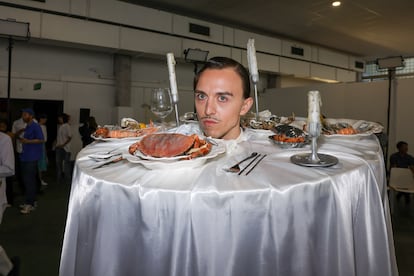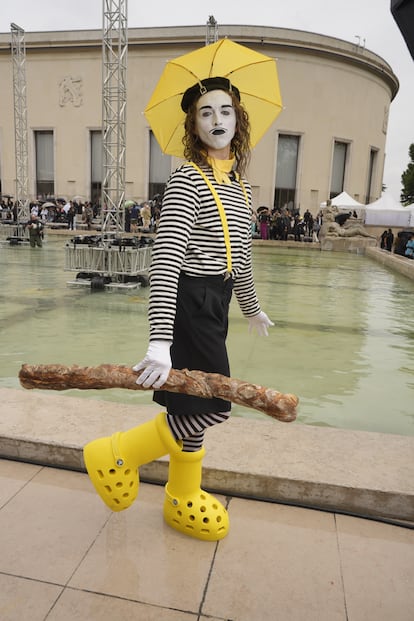Tommy Cash, the Estonian rapper revolutionizing the runway with his eccentric costumes
A friend of designer Rick Owens who collaborates with artists like Charli XCX, Boys Noize and Oliver Tree, the trap artist and provocateur is turning heads in the fashion world with his bizarre and outrageous performances

This week in Paris, the designer Jean Paul Gaultier presented his latest collection of haute couture for the fall and winter seasons, in a fashion show featuring Julien Dossena, creative director at Rabanne, as a guest designer. While Gaultier’s 33 looks, inspired by 33 Parisian monuments and sites, strutted down the runway, in the front row of the audience, a spectator easily mistaken for a Sacha Baron Cohen character watched the event in a flesh-colored, muscularly shaped tuxedo designed by Jiawei Han — a trompe l’oeil of a nude body builder (pale-flesh jacket and pants with white shirt and black tie underneath). The muscular man in the audience was doing exercises, stretched, and periodically eating spoonfuls of protein powder from a large container. Despite the best efforts of the woman on his right to contain her laughter, and despite the haste with which the influencer Emma Chamberlain could be seen rejecting his offer to join him in gulping down the powdered bodybuilding supplement, the man’s presence, and performance, were far from a surprise: everyone expected the Estonian rapper turned fashion provocateur Tommy Cash (Tallinn, 31 years old), by now a well-known eccentricity in the fashion world, to cause some kind of a scandal.
In March, Cash was once again starred in the front row when he dressing as a person sleeping in a huge bed at the Y/Project runway show during Paris Fashion Week, seated just a few feet away from more restrained celebrities, such as Avril Lavigne and rapper Tyga. Cash’s Instagram is a bottomless pit of weird and wacky interventions, from imitating fashion legend Anna Wintour to walking drones — on leashes, like dogs — in public. He appeared at the Doublet fashion show two weeks ago dressed as a dining table replete with sea food, glasses and candles; as a baby in a stroller at the Marine Serre show; as a cleaning lady (bucket and mop in hand) at the Diesel show; and as the French mime Marcel Marceau at another event hosted by his good friend and supporter, designer Rick Owens. Cash and Owens have teamed up on several occasions. Their most well-known collaboration thus far was a joint exhibition titled The Pure and the Damned (2019), presented in his native Tallinn, the capital of Estonia, and involving, among the many pieces on display, a jar containing Cash’s semen (originating, according to the artist, from a single ejaculation). “At first I thought I’d like to have it on my merch site to kinda sell sperm to my fans,” he told Vice in an interview. “The sperm is alive right? It’s a real tank and everything, so [the fans] can do whatever. It won’t be like they’re my children, but they can do whatever with it. That’s kind of the art part.” The jar of sperm is currently located at Owen’s home.
Cash’s rise as a public, and more or less disruptive, figure — disruptive, of course, only insofar as he appears at events to which he has been previously invited, with the expectation that he will put on some sort of outrageous show — has been in almost inverse proportion to his career in music, where, in recent years, he has shown proven less prolific. With two full-length albums released in 2014 and 2018, Tommy Cash was one of the most prominent names in the international rise of trap as a popular genre during that period. Already a popular name in the world of trap, Cash gained a more general notoriety with his performance of the live track Winaloto for the music platform Colors in 2016. And in an impressive music video for that same song, written and co-directed by Cash himself, the rapper also demonstrated his talent as a provocative visual artist. He has performed in Spain on several occasions, most recently in 2022, and has collaborated with the Spanish musicians Pimp Flaco and Kinder Malo. His list of collaborators also includes Charli XCX, Kim Petras, Oliver Tree and Boys Noize.


Far from being “a scientific experiment that escaped from Kazakhstan,” as he claims in the lyrics to his song “Guez whoz bak,” Cash is an Estonian born to a Russian father and Ukrainian mother. His Baltic DNA is inseparable from his work, which frequently pokes fun at the post-Soviet hangover and how the abrupt intervention of all things Western shaped his cultural identity: the nature of being born in the USSR the year it dissolved, in 1991. Rick Owens, according to the designer himself, was the one who helped Cash “find himself.” Owens, who used Cash’s music for his runway shows, became close friends with the rapper, and their friendship has evolved into a stable artistic relationship. They have launched clothing lines together (after Cash launched his own solo fashion project, a parody of Kanye West, in 2018), and Owens has become a role model for Cash — someone the Estonian, in an interview with Interview Magazine, openly referred to as his “daddy.” Cash’s fans are apparently delighted with their idol’s colorful flair: when the young man released a song featuring Owens in 2018, the histrionic Mona Lisa, it was hailed by many on social media as a “masterpiece.”
The author of songs such as “Pussy Money Weed,” “Little Molly,” and “Leave Me Alone — and the surreal music videos that accompany them, directed by Anna Himma of Iconoclast Studio — is scheduled to perform at a festival in the Czech Republic at the end of July, and in Toronto, Canada in November. If Cash has plans for other performances, it doesn’t look like fans will find out about them on his official website, which is dedicated solely to the sale of clothes and accessories. Devotees of the versatile artist who hope to hear or see something new will just have to wait for the next surprise.
Sign up for our weekly newsletter to get more English-language news coverage from EL PAÍS USA Edition
Tu suscripción se está usando en otro dispositivo
¿Quieres añadir otro usuario a tu suscripción?
Si continúas leyendo en este dispositivo, no se podrá leer en el otro.
FlechaTu suscripción se está usando en otro dispositivo y solo puedes acceder a EL PAÍS desde un dispositivo a la vez.
Si quieres compartir tu cuenta, cambia tu suscripción a la modalidad Premium, así podrás añadir otro usuario. Cada uno accederá con su propia cuenta de email, lo que os permitirá personalizar vuestra experiencia en EL PAÍS.
¿Tienes una suscripción de empresa? Accede aquí para contratar más cuentas.
En el caso de no saber quién está usando tu cuenta, te recomendamos cambiar tu contraseña aquí.
Si decides continuar compartiendo tu cuenta, este mensaje se mostrará en tu dispositivo y en el de la otra persona que está usando tu cuenta de forma indefinida, afectando a tu experiencia de lectura. Puedes consultar aquí los términos y condiciones de la suscripción digital.









































